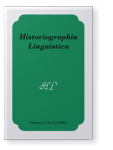Vol. 13:2/3 (1986) ► pp.323–342
Islands in the stream
The grammarians of late antiquity
The Latin grammarians of late antiquity seem to personify the cultural stagnation and decline that have commonly been thought to typify the age. Resting upon conceptual foundations that had been laid centuries earlier and repeating the same doctrine from generation to generation, their texts appear by and large to be wholly untouched by originality. This paper addresses the question: why was this so? To suggest one answer to this question, the argument begins from the premise that the tradition remained as stable as it did because it continued to satisfy certain needs; the paper then goes on to consider these needs and their interaction.
First, there are the needs of the grammarians themselves. From the beginnings of the profession’s history in the first century B.C. and first century A.D., when the grammarians’ schools first emerged as distinct institutions at Rome, the grammarians’ doctrine, with its emphasis on the rational analysis of the language’s ‘nature’, provided them with the authority they needed to prescribe correct speech for the social and cultural elite that they served. Once this exercise of reason had made a place for the grammarians as relative newcomers to the world of liberal letters, the doctrine was something to be prized and defended: the vivid instruction of the late antique grammarian Pompeius shows us a man fortified and buoyed up by his profession’s tradition, eager to assert its soundness or to add an improving touch here or there – and without the least wish or incentive to attempt some fundamental innovation; for to do so would be to tamper with the honorable social position that the profession provided. At the same time, the mainstream of the educated elite – the second group whose needs must be considered – would themselves have had little reason to encourage innovation: since a liberal education, based of course on grammar, had come to be one of the most important marks of social – and even moral – status, the honorable position of the elite was as much tied as the grammarians’ to the maintenance of the traditional doctrine. As a result, when the interests of the grammarians and the educated elite met in the institution of patronage, on which all teachers depended, the stability of the tradition was reinforced: for patrons did not seek innovative brilliance in their dependents, nor did they even look primarily for technical competence; they rather looked first for traditionally valued personal qualities like modesty and diligence, and other such qualities that would tend to preserve the status quo.
